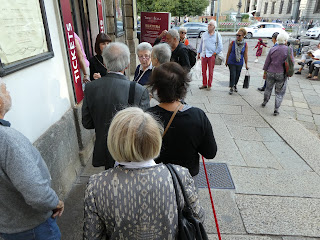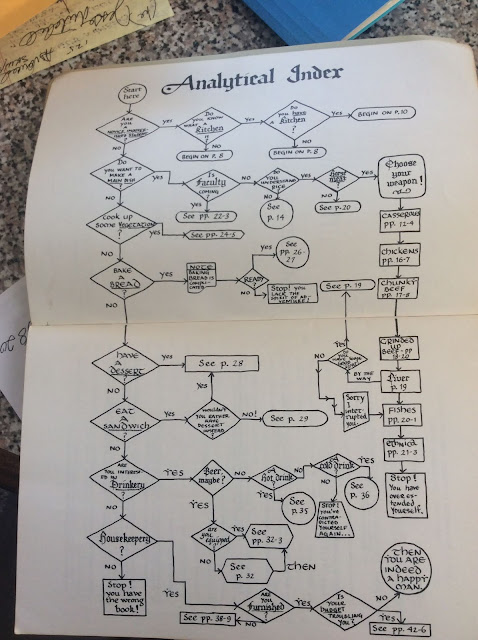Someone in our small town has hung up their apron for the last time—probably a well-heeled and enthusiastic cook. I’m sure of this because ten boxes of good cookbooks are piled up in the workroom. Cooks don’t donate their cookbooks to the Bottom Shelf bookstore just because they’ve moved. It takes more than a change of address to separate them from their collections.
The best cookbooks we get, in my opinion, are dog-eared and rich with marginalia. Often a flutter of magazine clippings and cook’s notes will fall out of the pages.They reveal more about the donors than the book choices. On a recipe for sweet potatoes—”Thanksgiving—everyone liked it. Add one tsp. vanilla.” The author/cook cannot leave well enough alone.
“I don’t like shiny food,” says Jean, our shift manager, as she scans a couple of the photos and thumbs through recipes. She has a keen and discriminating eye. She shows me more photos. A slab of unidentifiable meat bathed in maroon sauce glistens under the light. She shudders and marks the book $.10. The book sold for $29.95 when it was new. Now it has the same value as a tissue-thin plastic bag from Walmart.
Jean looks over the five boxes on our work table. “Set aside anything with gelatin in the title,” she says.
“Here’s one—Jello Jigglers,” Miranda says plucking a thin volume from the pile. At twenty-eight, Miranda is the youngest of us. “How did you all survive eating this stuff? It’s so obviously devoid of any nutrition. What’s in it? Chemicals, food coloring and sugar?” Jean at eighty-six is the oldest of our managers. She and Miranda share a love for The New Yorker and James Thurber. Somehow, the conversation has drifted to a discussion of favorite Thurber works. I enjoy listening to the intergenerational discussion which includes details about Thurber’s height (short) and temperament (mean). Both Jean and Miranda like Thurber’s dominant women and spineless men. Although I don’t join in, I think about Walter Mitty, my favorite Thurber creation and his made-up medical jargon like “obsteosis of the ductal tract.” My own father suffered from a number of such illnesses which would strike without fail just before mass on Sunday morning and require immediate bed rest.
“Where’s your father this morning?” the priest, Father McIlhenny, would ask us after mass as my sister and I filled by.
“He’s got hypotocusis in the hoodinacapap,” I would answer. My older sister, by then wise to my father’s jokes, let me tell the priest. The words came easily and fast to me because I said/sang them while I skipped rope.
“Again?” Father McIlhenny would smile. I suspect he was a Thurber fan too.
Back in the workroom, I look through the jiggly book. The jello photography is disastrous—plates crowded with clashing colors and shapes, vegetables frozen in aspic like tortured souls in hell. The color separations are poor and the printing is fuzzy enough to make me think my freshly de-cataracted eyes are failing. Miranda, wicked smart and energetic, eats only organic vegetarian foods—a living testimony to the health benefits of kale. She makes me feel like rushing home to eat a bag of carrots.
I ask her opinion about the political correctness of the word “jiggler” which sounds vaguely offensive to my ear. I think of big round Santa Claus bellies, massive ungirdled asses, the handles of running toilets. There were no recipe sensitivity readers when these were printed. I wonder if there are now?
Years ago, I used “prick” in the instructions on a package of frozen pie dough. My boss reddened with embarrassment from his collar to his hairline, as he read my instructions and told me I could not use the word in print. EVER.
“But that’s what you do,” I said, in disbelief. “You prick a pie crust before you bake it. It’s a culinary term.” My arguments fell on deaf ears. “Pierce with the times of a fork,” was the expression we used instead. Pierce was much more tolerable for my straight-laced Swedish boss but still bothers me forty years later. I wonder what he’d say today now that the word pierce, hijacked by the body-art business, conjures up different thoughts. People pierce body parts I didn’t even know existed like the frenulum and ampallang. My niece talks about her industrial and tragus jewelry. God only knows where they are. If I was still writing instructions, Ole, my boss, might now prefer “prick” over “pierce.”
Jean picks up a non-cookbook volume which reminds her of her small Iowa town’s daily newspaper, The Eagletown Echo and the “What’s happening” column which contained all the local news. “They talk about Facebook disclosing too much now,” she laughs. “That’s crazier than a fart in a skillet. You didn’t have any secrets back then. If you traveled all the way to Des Moines, fifty miles away, the Eagleton Echo would have a reporter on your doorstep asking for details. And before nightfall, everyone in town would have read the story and judged everything you did.”
A customer interrupts. “What’s that?” She points to a handwritten note on the counter.
“Oh, probably something somebody found in a book,” I say. “We keep those. They’re amusing. This looks like a shopping list: one-half pound ground lamb,”…
“Hey,” she says. “That sounds like what I’m off to buy. I need lamb for the meatballs I'm making.” She gropes around in her big floral tote, looks up at me and back at the list. “Hey, that’s my list! I must have dropped it.” We laugh that we were both oblivious, thinking it a coincidence.
“So, what are you making?” I say.
“An Alton Brown recipe for meatballs you put in paper egg cartons and bake in the oven. The grease is absorbed and the meatballs get crispy.”
I suggest she add a fire extinguisher to the list of ingredients.
4/16/19













